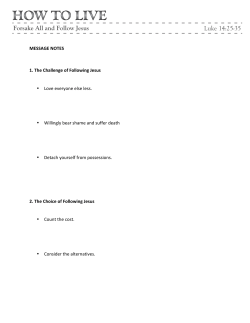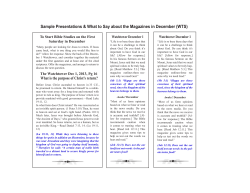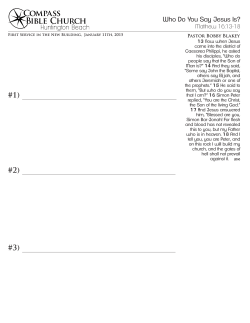
Jesus Loves Terrorists - Challenge Men`s Ministry
Jesus Loves Terrorists Acts 9:1-16 May 17, 2015 Nothing is too hard for God to do, and no one is too lost for God to save. This truth is especially important as we consider this week’s topic: terrorists. In the early church, the conversion of the terrorist Saul of Tarsus shook the ranks. His conversion, however, affirmed the words of Christ, who said, “The things which are impossible with men are possible with God” (Luke 18:27). Saul had terrorized Christians, yet this radical became an apostle. One of the church’s greatest opponents became its greatest proponent, and a chief adversary became a chief advocate. In Acts 9, we make three discoveries about terrorism—three pieces to this complex puzzle, three realities that mark our world even as they marked the ancient world. First, terrorism is a reality (see Acts 9:1-2). Persecuting Christians became Saul’s obsession. We see that Stephen’s killers “laid down their clothes at the feet of a young man named Saul” (Acts 7:58) and that Saul was “consenting to his death” (Acts 8:1). Furthermore, Saul “made havoc of the church, entering every house, and dragging off men and women, committing them to prison” (Acts 8:3). The word havoc describes a wild boar rampaging through a garden or an army devastating a city. Something evil had happened inside Saul of Tarsus—his anger had fully taken over. Just before his conversion, he was “still breathing threats and murder” (Acts 9:1). He was intent on mobilizing his jihad and headed north to Damascus. Jesus, however, had other plans. We are familiar with the rise of modern terrorism and its atrocities, but the Old Testament world was also full of terrorists. Nineveh (modern day Mosul, a center for ISIS) was a city of terrorists; Jonah did not want to go there because of their reputation for carnage. They tore off the lips and hands of victims, flayed captives alive, and piled up the skulls of their victims—and yet God wanted a message of repentance preached there. Jesus Himself lived under an occupying force—the iron fist of Rome—by which He was crucified. Crucifixion itself was state-sponsored terrorism, designed to terrorize people into compliance. On the other side of the terrorist spectrum were the Zealots, a local political movement that sought to overthrow Rome by violent means. And yet, Jesus chose Simon the Zealot to be one of the Twelve. And then we have Saul, an educated, intellectual terrorist from Tarsus who specifically targeted followers of Christ before Jesus got his attention. Read Paul’s own admission of this in Galatians 1:13-24. We often consider terrorists to be unreachable by the love of Christ. Who in your life do you consider to be unreachable? When have you bravely and humbly used your testimony to reach out to such a person? Next, terrorism demands a response (see Acts 9:2). Terrorism is a complicated issue—one that angers, saddens, and frightens us. How should we respond? In reading this passage, we distinguish two kinds of responses: our individual response as believers and our government’s response as a nation. Many Christians confuse or blend the two, drawing on the Sermon on the Mount and Jesus’ command to turn the other cheek (see Matthew 5:38-48). However, that sermon is not a foreign policy statement but a personal strategy about how to respond to evil on an individual level. It is the job of the state to protect its citizens, but it is the mandate of the Christian to forgive our enemies. If that sermon was meant to be a national policy, it would be a permission slip for thugs and terrorists to wreak havoc! On the contrary, Romans 13 articulates that the state is a divinely ordered institution whose job is to punish evil (see vv. 3-4). Romans 12, however, teaches us the importance of personal forgiveness and the acceptance of persecution for the Lord’s sake (see vv. 17-21). So, for society it is an eye for eye, but for the believer there is the encouragement that God will personally avenge the harm we’ve been done. It is not the church’s job to stop oppression; it is the church’s job to preach the gospel and accept the consequences of faithfully doing so. We overcome evil not through personal retaliation but by principled compassion. Skip told a story of how he met a pastor in Iraq who had been beaten by members of ISIS. This pastor told Skip that forgiveness is the only hope for Iraq’s future. Do you hope that forgiveness can break the cycle of terror? How can this begin in your life? Who can you forgive that seems beyond God’s reach? Lastly, terrorists can be reached (see Acts 9:4-16). Jesus doesn’t love terrorism, but He does love terrorists as people for whom He died. Often we don’t want to hear this, but Saul’s life proved this. What people have you written off as “Most Unlikely to Be Saved”? God can find a way where there is no way. Saul’s past deeds haunted him; God took that haunting and turned it to healing and then to heralding. Many other terrorists throughout the history of the church have become children of Jesus. Remember, Jesus asked Saul why he had been persecuting Him (see Acts 9:4). In other words, Jesus takes the pain of those who suffer for His name’s sake personally. We never suffer alone, and no blow struck on earth goes unfelt in heaven. Read 1 Timothy 1:15-16. God’s presence is our comfort, but it’s also part of His plan to love and radically save even the most unlikely people. When have you seen God find a way where there was no way? Why is this an essential part of His plan? The BIG Idea Adapted from Pastor Skip’s teaching None are too lost to save; nothing is too hard for God.
© Copyright 2025











